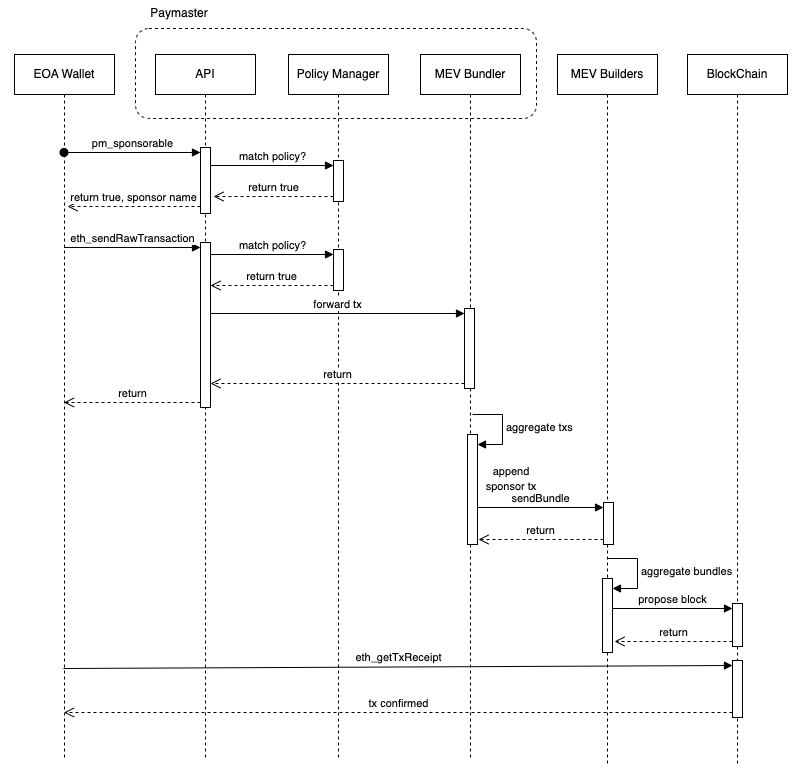Wallet Integration
This guide outlines the steps for wallet developers to integrate MegaFuel, enabling gas fee sponsorship for their users. This permissionless solution is open to all wallets.
Paymaster Endpoint
Supported on both BNB Smart Chain and OpBNB.
Endpoint
-
BNB Smart Chain (BSC)
- Mainnet:
https://bsc-megafuel.nodereal.io/ - Testnet:
https://bsc-megafuel-testnet.nodereal.io/
- Mainnet:
-
opBNB
- Mainnet:
https://opbnb-megafuel.nodereal.io/ - Testnet:
https://opbnb-megafuel-testnet.nodereal.io/
- Mainnet:
Example Client Code
This repository contains a series of code examples demonstrating MegaFuel integration across multiple scenarios, including wallet integration and payment gateway integration. The codebase is implemented in both Golang and JavaScript.
Interaction Workflow

Integration requires adapting the transaction flow to work with MegaFuel's paymaster system. For detailed information about the paymaster API interface, please refer to this document.
The main steps are:
- Transaction Preparation:
- When a user initiates a transaction, first call
pm_sponsorableto check if it's eligible for sponsorship. - If sponsorable, set the transaction's gas price to zero.
- When a user initiates a transaction, first call
- User Notification:
- Inform the user that the transaction will be gas-free and sponsored by the "sponsor name" returned by the API.
- Transaction Signing:
- Have the user sign the zero-gas-price transaction.
- Submission to MegaFuel:
- Send the signed transaction to the MegaFuel through
eth_sendRawTransactionAPI. - When making the eth_sendRawTransaction request, please set the "User-Agent" header to the wallet application's name. This practice helps MegaFuel better understand usage patterns and improve services. For example -H “User-Agent: your-wallet-name/v1.0.0”. Example code for reference.
- Send the signed transaction to the MegaFuel through
- Response Handling:
- Process the paymaster's response:
- If successful, inform the user that the transaction is submitted.
- If failed, consider falling back to normal transaction processing or inform the user of the failure.
- Process the paymaster's response:
- Transaction Monitoring:
- Monitor the transaction status as usual.
Best Practice
- Always check sponsorability before setting gas price to zero.
- Provide clear information to user about who sponsor the tx.
- Implement fallback mechanisms for sponsorship failures.
- Consider fallback mechanisms for non-sponsored transactions.
Q&A
-
What are the odds of the eth_sendRawTransaction call failing after pm_sponsorable returns is_sponsorable: true?
Answer: For wallet retail users, the failure probability is minimal.
There are two main potential failure scenarios:- A timing issue where sponsor funds are available during the pm_sponsorable check but depleted when eth_sendRawTransaction executes.
- Nonce mismatch errors, since the pm_sponsorable API doesn't include a nonce field, but eth_sendRawTransaction API will check nonce. To prevent this, we recommend fetching the correct nonce via MegaFuel's API endpoint when constructing gasless transactions.
-
Which specific errors or error codes from pm_sponsorable and eth_sendRawTransaction indicate that we should retry the sponsorable transaction?
Answer:
- The pm_sponsorable API serves as a validator for gasless transaction eligibility. Any negative(false) response or error from this API should trigger an immediate fallback to standard transaction processing.
- When eth_sendRawTransaction returns nonce-related errors ("nonce too high" or "nonce too low"), retries are appropriate as these issues are typically timing-related and may resolve after a brief delay when the correct nonce becomes available. However, all other error types indicate non-recoverable issues that won't be resolved through retries.
-
Is there a recommended practice for handling fallback scenarios when sending a sponsorable transaction fails?
Answer: It is suggested to show the error msg and automatically retry every subsequent transaction as a non-sponsored transaction without informing the user.
There are two cases indicate that the gasless paymaster may not work:- The eth_sendRawTransaction API return error;
- The eth_sendRawTransaction does not return an error, but the tx does not confirm on chain for a long time. A wallet can consider a gasless transaction failed if it hasn't been mined on BSC network within 120 seconds of submission or 42 seconds on opBNB network. A more precise method to fetch transaction status is to query MegaFuel API.
Updated 5 months ago
